Cohabitation Break-up: Legal Consequences in South Africa Analysis
VerifiedAdded on 2023/01/05
|13
|3805
|56
Report
AI Summary
This report provides a detailed analysis of the legal consequences following the dissolution of cohabitation relationships under South African law. It begins by defining cohabitation and its legal standing, emphasizing that, unlike marriage, cohabitation in South Africa is often treated as a common-law marriage with limited legal recognition. The report explores key aspects, including the lack of automatic property rights, the absence of maintenance obligations, and the importance of cohabitation agreements. It examines the concept of a universal partnership, which may influence property division, and the criteria required to prove its existence. Furthermore, the report discusses the legal rules governing cohabitation, including the absence of specific legislation, the implications for inheritance, and the limited access to certain rights enjoyed by married couples. The report also highlights specific areas where cohabitants share similar rights with married couples, such as those related to domestic violence and medical schemes. It concludes by underscoring the significance of cohabitation agreements in determining property division and other obligations after the relationship ends, referencing relevant case law to illustrate legal principles. The report also includes an overview of the assignment brief, which provides details on the report's structure and format, including referencing requirements and submission guidelines. The report aims to offer a comprehensive understanding of cohabitation law and its practical implications in South Africa, aiding students in their legal studies.
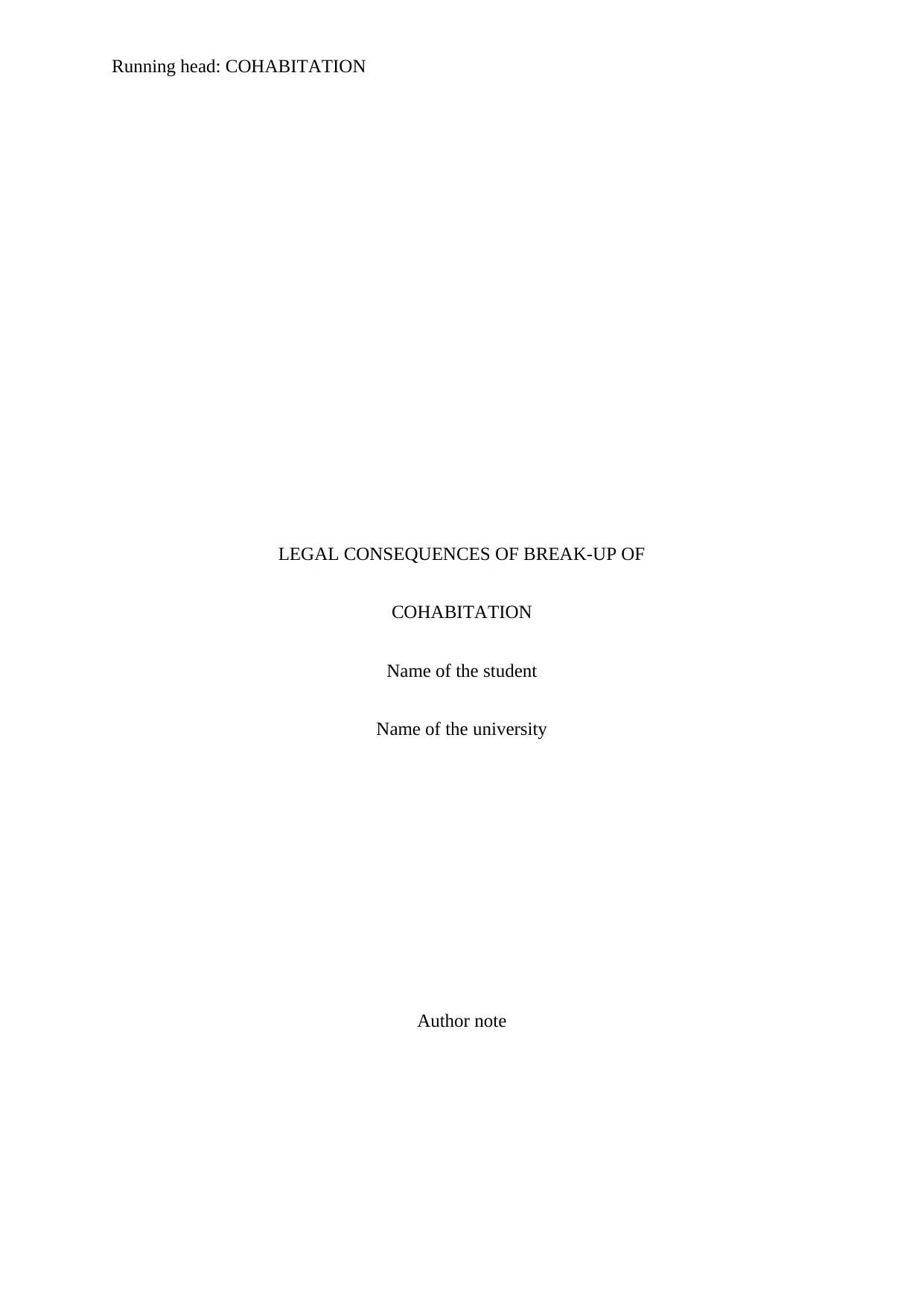
Running head: COHABITATION
LEGAL CONSEQUENCES OF BREAK-UP OF
COHABITATION
Name of the student
Name of the university
Author note
LEGAL CONSEQUENCES OF BREAK-UP OF
COHABITATION
Name of the student
Name of the university
Author note
Paraphrase This Document
Need a fresh take? Get an instant paraphrase of this document with our AI Paraphraser
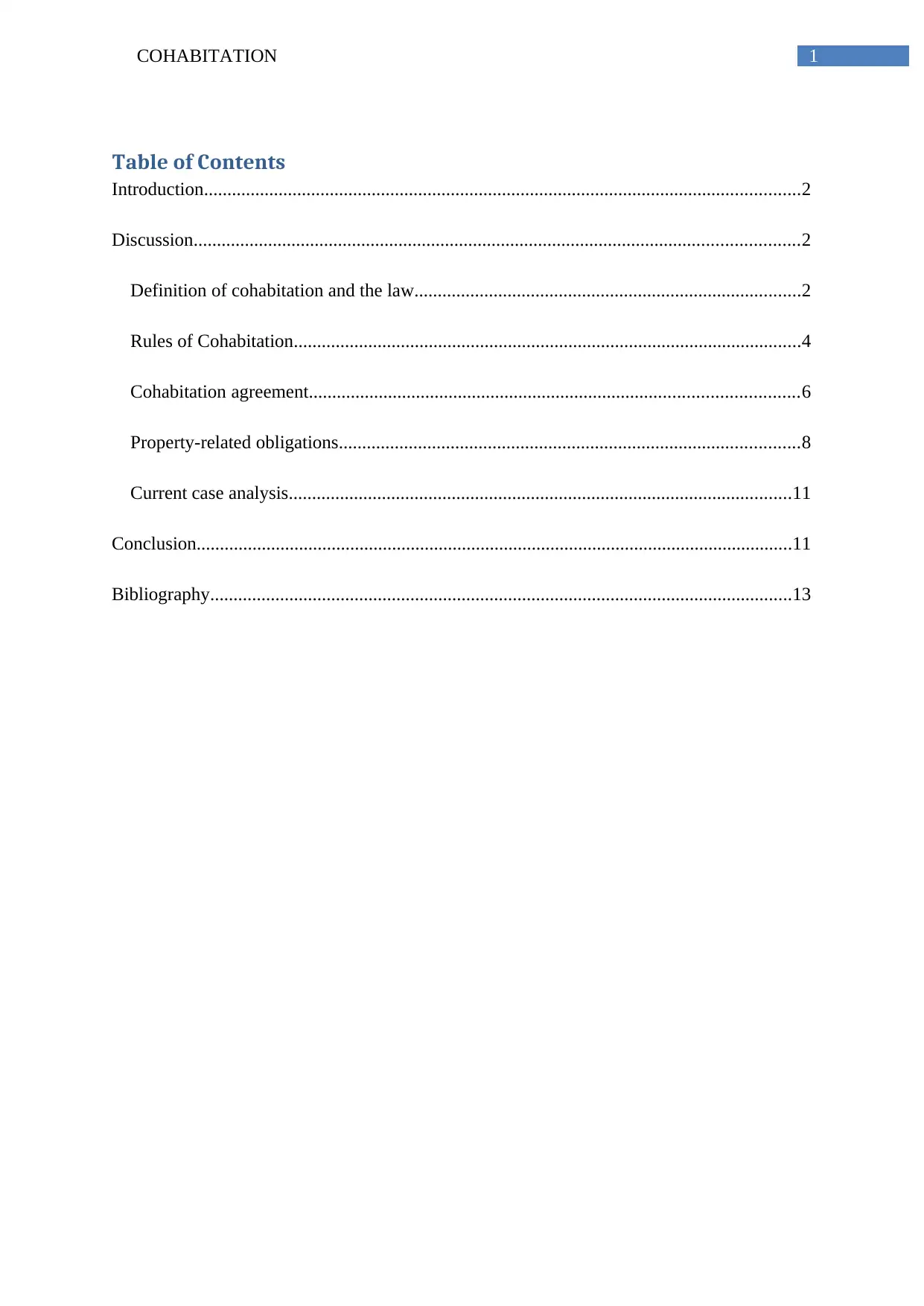
1COHABITATION
Table of Contents
Introduction................................................................................................................................2
Discussion..................................................................................................................................2
Definition of cohabitation and the law...................................................................................2
Rules of Cohabitation.............................................................................................................4
Cohabitation agreement.........................................................................................................6
Property-related obligations...................................................................................................8
Current case analysis............................................................................................................11
Conclusion................................................................................................................................11
Bibliography.............................................................................................................................13
Table of Contents
Introduction................................................................................................................................2
Discussion..................................................................................................................................2
Definition of cohabitation and the law...................................................................................2
Rules of Cohabitation.............................................................................................................4
Cohabitation agreement.........................................................................................................6
Property-related obligations...................................................................................................8
Current case analysis............................................................................................................11
Conclusion................................................................................................................................11
Bibliography.............................................................................................................................13
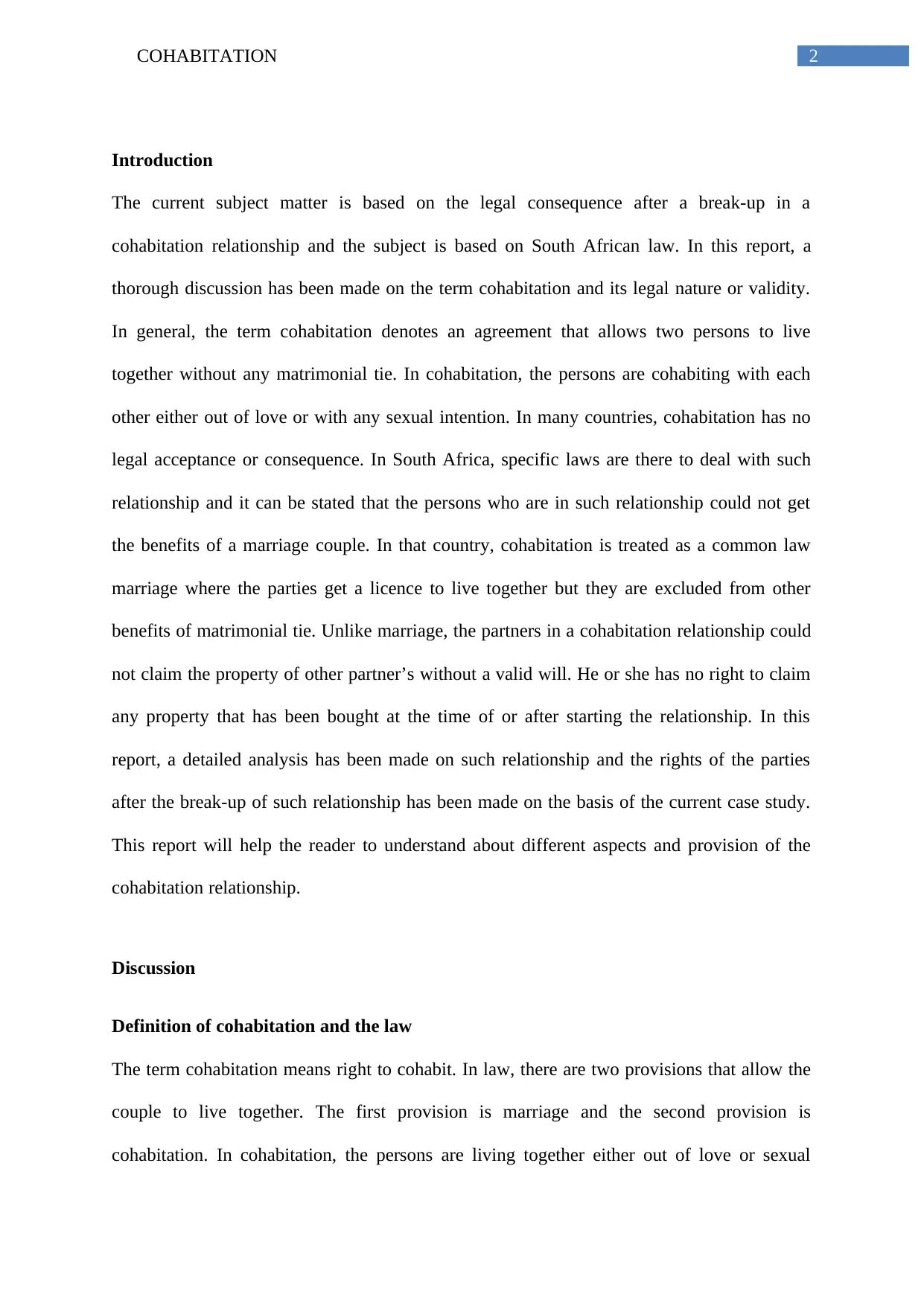
2COHABITATION
Introduction
The current subject matter is based on the legal consequence after a break-up in a
cohabitation relationship and the subject is based on South African law. In this report, a
thorough discussion has been made on the term cohabitation and its legal nature or validity.
In general, the term cohabitation denotes an agreement that allows two persons to live
together without any matrimonial tie. In cohabitation, the persons are cohabiting with each
other either out of love or with any sexual intention. In many countries, cohabitation has no
legal acceptance or consequence. In South Africa, specific laws are there to deal with such
relationship and it can be stated that the persons who are in such relationship could not get
the benefits of a marriage couple. In that country, cohabitation is treated as a common law
marriage where the parties get a licence to live together but they are excluded from other
benefits of matrimonial tie. Unlike marriage, the partners in a cohabitation relationship could
not claim the property of other partner’s without a valid will. He or she has no right to claim
any property that has been bought at the time of or after starting the relationship. In this
report, a detailed analysis has been made on such relationship and the rights of the parties
after the break-up of such relationship has been made on the basis of the current case study.
This report will help the reader to understand about different aspects and provision of the
cohabitation relationship.
Discussion
Definition of cohabitation and the law
The term cohabitation means right to cohabit. In law, there are two provisions that allow the
couple to live together. The first provision is marriage and the second provision is
cohabitation. In cohabitation, the persons are living together either out of love or sexual
Introduction
The current subject matter is based on the legal consequence after a break-up in a
cohabitation relationship and the subject is based on South African law. In this report, a
thorough discussion has been made on the term cohabitation and its legal nature or validity.
In general, the term cohabitation denotes an agreement that allows two persons to live
together without any matrimonial tie. In cohabitation, the persons are cohabiting with each
other either out of love or with any sexual intention. In many countries, cohabitation has no
legal acceptance or consequence. In South Africa, specific laws are there to deal with such
relationship and it can be stated that the persons who are in such relationship could not get
the benefits of a marriage couple. In that country, cohabitation is treated as a common law
marriage where the parties get a licence to live together but they are excluded from other
benefits of matrimonial tie. Unlike marriage, the partners in a cohabitation relationship could
not claim the property of other partner’s without a valid will. He or she has no right to claim
any property that has been bought at the time of or after starting the relationship. In this
report, a detailed analysis has been made on such relationship and the rights of the parties
after the break-up of such relationship has been made on the basis of the current case study.
This report will help the reader to understand about different aspects and provision of the
cohabitation relationship.
Discussion
Definition of cohabitation and the law
The term cohabitation means right to cohabit. In law, there are two provisions that allow the
couple to live together. The first provision is marriage and the second provision is
cohabitation. In cohabitation, the persons are living together either out of love or sexual
⊘ This is a preview!⊘
Do you want full access?
Subscribe today to unlock all pages.

Trusted by 1+ million students worldwide
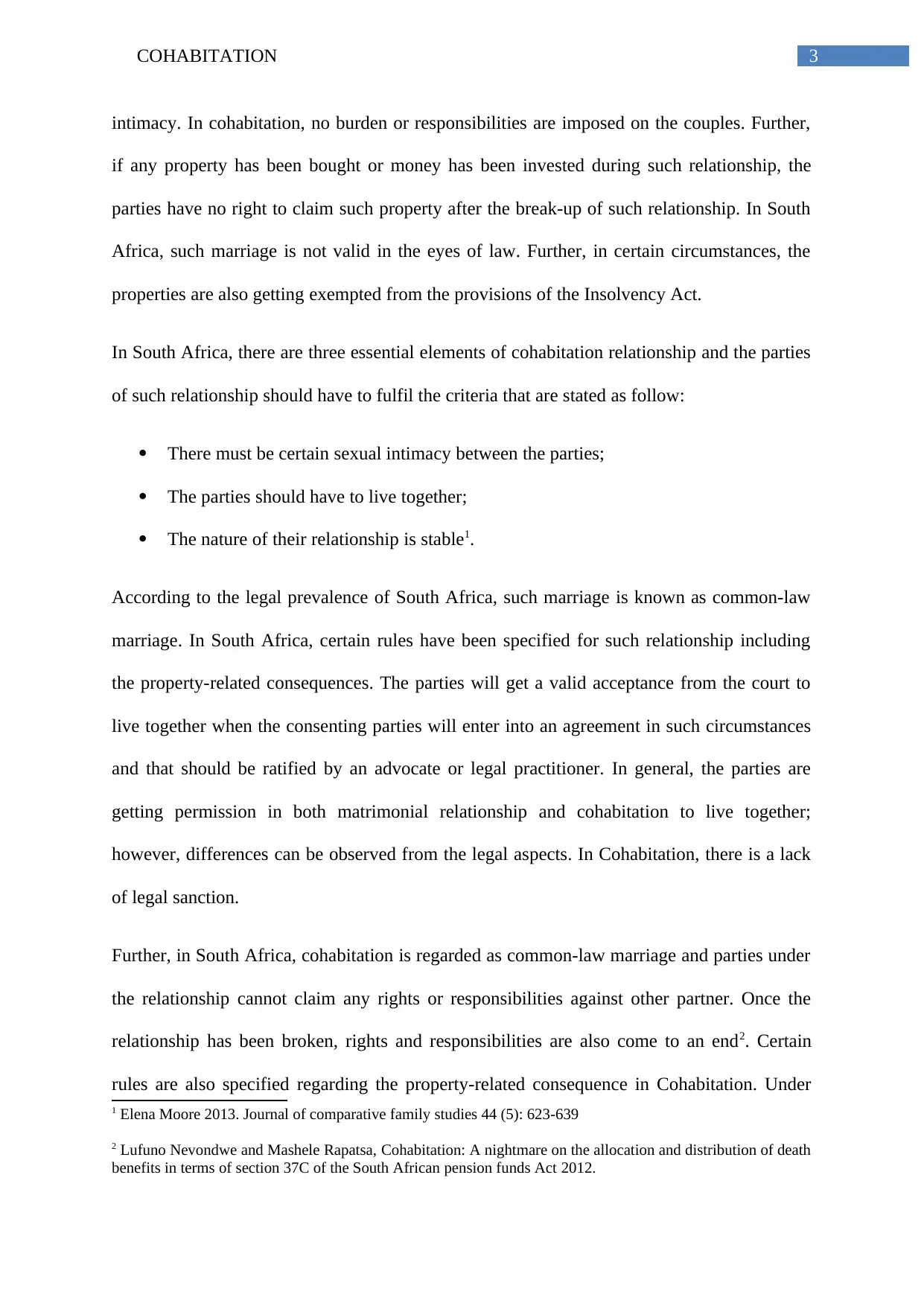
3COHABITATION
intimacy. In cohabitation, no burden or responsibilities are imposed on the couples. Further,
if any property has been bought or money has been invested during such relationship, the
parties have no right to claim such property after the break-up of such relationship. In South
Africa, such marriage is not valid in the eyes of law. Further, in certain circumstances, the
properties are also getting exempted from the provisions of the Insolvency Act.
In South Africa, there are three essential elements of cohabitation relationship and the parties
of such relationship should have to fulfil the criteria that are stated as follow:
There must be certain sexual intimacy between the parties;
The parties should have to live together;
The nature of their relationship is stable1.
According to the legal prevalence of South Africa, such marriage is known as common-law
marriage. In South Africa, certain rules have been specified for such relationship including
the property-related consequences. The parties will get a valid acceptance from the court to
live together when the consenting parties will enter into an agreement in such circumstances
and that should be ratified by an advocate or legal practitioner. In general, the parties are
getting permission in both matrimonial relationship and cohabitation to live together;
however, differences can be observed from the legal aspects. In Cohabitation, there is a lack
of legal sanction.
Further, in South Africa, cohabitation is regarded as common-law marriage and parties under
the relationship cannot claim any rights or responsibilities against other partner. Once the
relationship has been broken, rights and responsibilities are also come to an end2. Certain
rules are also specified regarding the property-related consequence in Cohabitation. Under
1 Elena Moore 2013. Journal of comparative family studies 44 (5): 623-639
2 Lufuno Nevondwe and Mashele Rapatsa, Cohabitation: A nightmare on the allocation and distribution of death
benefits in terms of section 37C of the South African pension funds Act 2012.
intimacy. In cohabitation, no burden or responsibilities are imposed on the couples. Further,
if any property has been bought or money has been invested during such relationship, the
parties have no right to claim such property after the break-up of such relationship. In South
Africa, such marriage is not valid in the eyes of law. Further, in certain circumstances, the
properties are also getting exempted from the provisions of the Insolvency Act.
In South Africa, there are three essential elements of cohabitation relationship and the parties
of such relationship should have to fulfil the criteria that are stated as follow:
There must be certain sexual intimacy between the parties;
The parties should have to live together;
The nature of their relationship is stable1.
According to the legal prevalence of South Africa, such marriage is known as common-law
marriage. In South Africa, certain rules have been specified for such relationship including
the property-related consequences. The parties will get a valid acceptance from the court to
live together when the consenting parties will enter into an agreement in such circumstances
and that should be ratified by an advocate or legal practitioner. In general, the parties are
getting permission in both matrimonial relationship and cohabitation to live together;
however, differences can be observed from the legal aspects. In Cohabitation, there is a lack
of legal sanction.
Further, in South Africa, cohabitation is regarded as common-law marriage and parties under
the relationship cannot claim any rights or responsibilities against other partner. Once the
relationship has been broken, rights and responsibilities are also come to an end2. Certain
rules are also specified regarding the property-related consequence in Cohabitation. Under
1 Elena Moore 2013. Journal of comparative family studies 44 (5): 623-639
2 Lufuno Nevondwe and Mashele Rapatsa, Cohabitation: A nightmare on the allocation and distribution of death
benefits in terms of section 37C of the South African pension funds Act 2012.
Paraphrase This Document
Need a fresh take? Get an instant paraphrase of this document with our AI Paraphraser
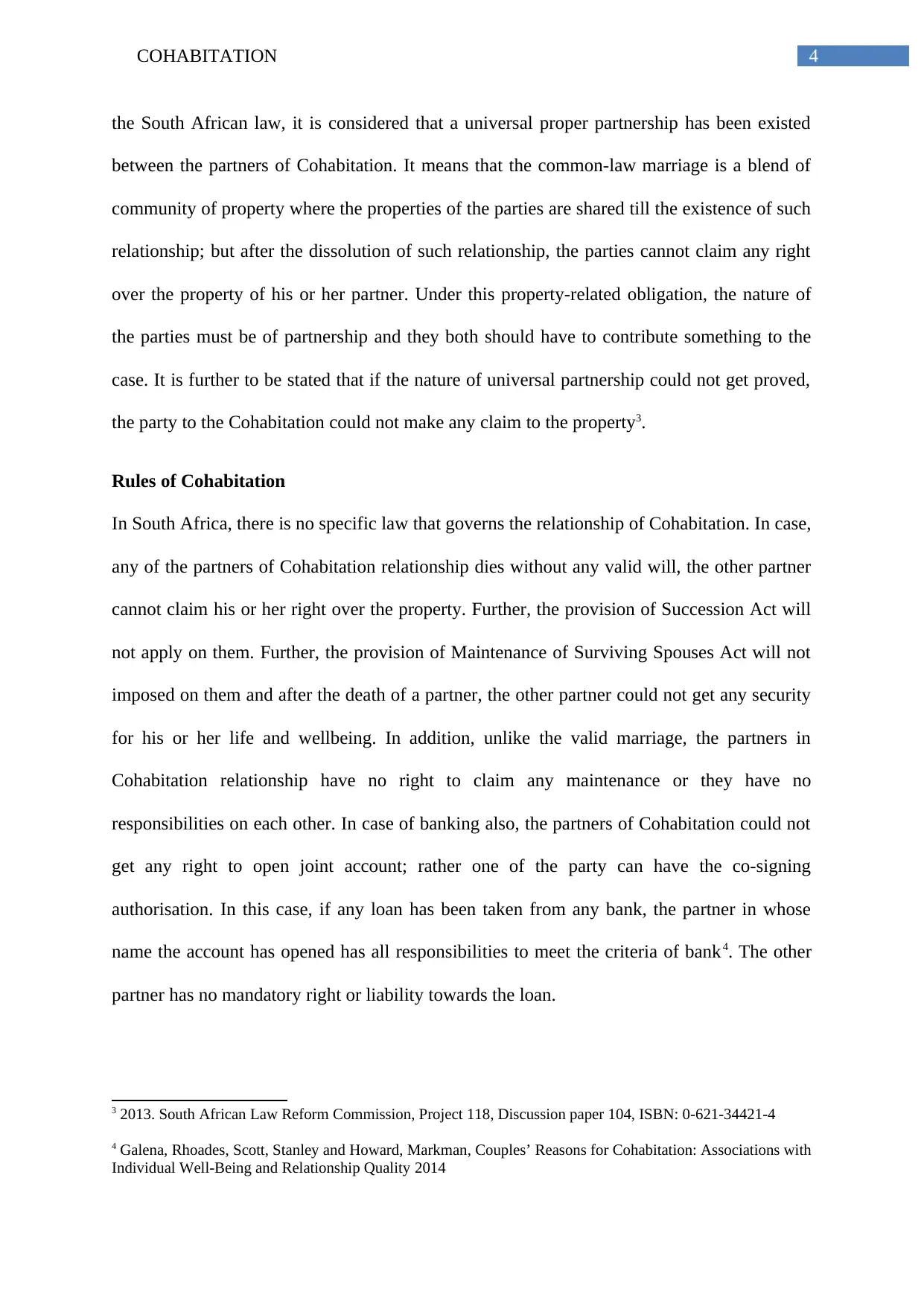
4COHABITATION
the South African law, it is considered that a universal proper partnership has been existed
between the partners of Cohabitation. It means that the common-law marriage is a blend of
community of property where the properties of the parties are shared till the existence of such
relationship; but after the dissolution of such relationship, the parties cannot claim any right
over the property of his or her partner. Under this property-related obligation, the nature of
the parties must be of partnership and they both should have to contribute something to the
case. It is further to be stated that if the nature of universal partnership could not get proved,
the party to the Cohabitation could not make any claim to the property3.
Rules of Cohabitation
In South Africa, there is no specific law that governs the relationship of Cohabitation. In case,
any of the partners of Cohabitation relationship dies without any valid will, the other partner
cannot claim his or her right over the property. Further, the provision of Succession Act will
not apply on them. Further, the provision of Maintenance of Surviving Spouses Act will not
imposed on them and after the death of a partner, the other partner could not get any security
for his or her life and wellbeing. In addition, unlike the valid marriage, the partners in
Cohabitation relationship have no right to claim any maintenance or they have no
responsibilities on each other. In case of banking also, the partners of Cohabitation could not
get any right to open joint account; rather one of the party can have the co-signing
authorisation. In this case, if any loan has been taken from any bank, the partner in whose
name the account has opened has all responsibilities to meet the criteria of bank4. The other
partner has no mandatory right or liability towards the loan.
3 2013. South African Law Reform Commission, Project 118, Discussion paper 104, ISBN: 0-621-34421-4
4 Galena, Rhoades, Scott, Stanley and Howard, Markman, Couples’ Reasons for Cohabitation: Associations with
Individual Well-Being and Relationship Quality 2014
the South African law, it is considered that a universal proper partnership has been existed
between the partners of Cohabitation. It means that the common-law marriage is a blend of
community of property where the properties of the parties are shared till the existence of such
relationship; but after the dissolution of such relationship, the parties cannot claim any right
over the property of his or her partner. Under this property-related obligation, the nature of
the parties must be of partnership and they both should have to contribute something to the
case. It is further to be stated that if the nature of universal partnership could not get proved,
the party to the Cohabitation could not make any claim to the property3.
Rules of Cohabitation
In South Africa, there is no specific law that governs the relationship of Cohabitation. In case,
any of the partners of Cohabitation relationship dies without any valid will, the other partner
cannot claim his or her right over the property. Further, the provision of Succession Act will
not apply on them. Further, the provision of Maintenance of Surviving Spouses Act will not
imposed on them and after the death of a partner, the other partner could not get any security
for his or her life and wellbeing. In addition, unlike the valid marriage, the partners in
Cohabitation relationship have no right to claim any maintenance or they have no
responsibilities on each other. In case of banking also, the partners of Cohabitation could not
get any right to open joint account; rather one of the party can have the co-signing
authorisation. In this case, if any loan has been taken from any bank, the partner in whose
name the account has opened has all responsibilities to meet the criteria of bank4. The other
partner has no mandatory right or liability towards the loan.
3 2013. South African Law Reform Commission, Project 118, Discussion paper 104, ISBN: 0-621-34421-4
4 Galena, Rhoades, Scott, Stanley and Howard, Markman, Couples’ Reasons for Cohabitation: Associations with
Individual Well-Being and Relationship Quality 2014
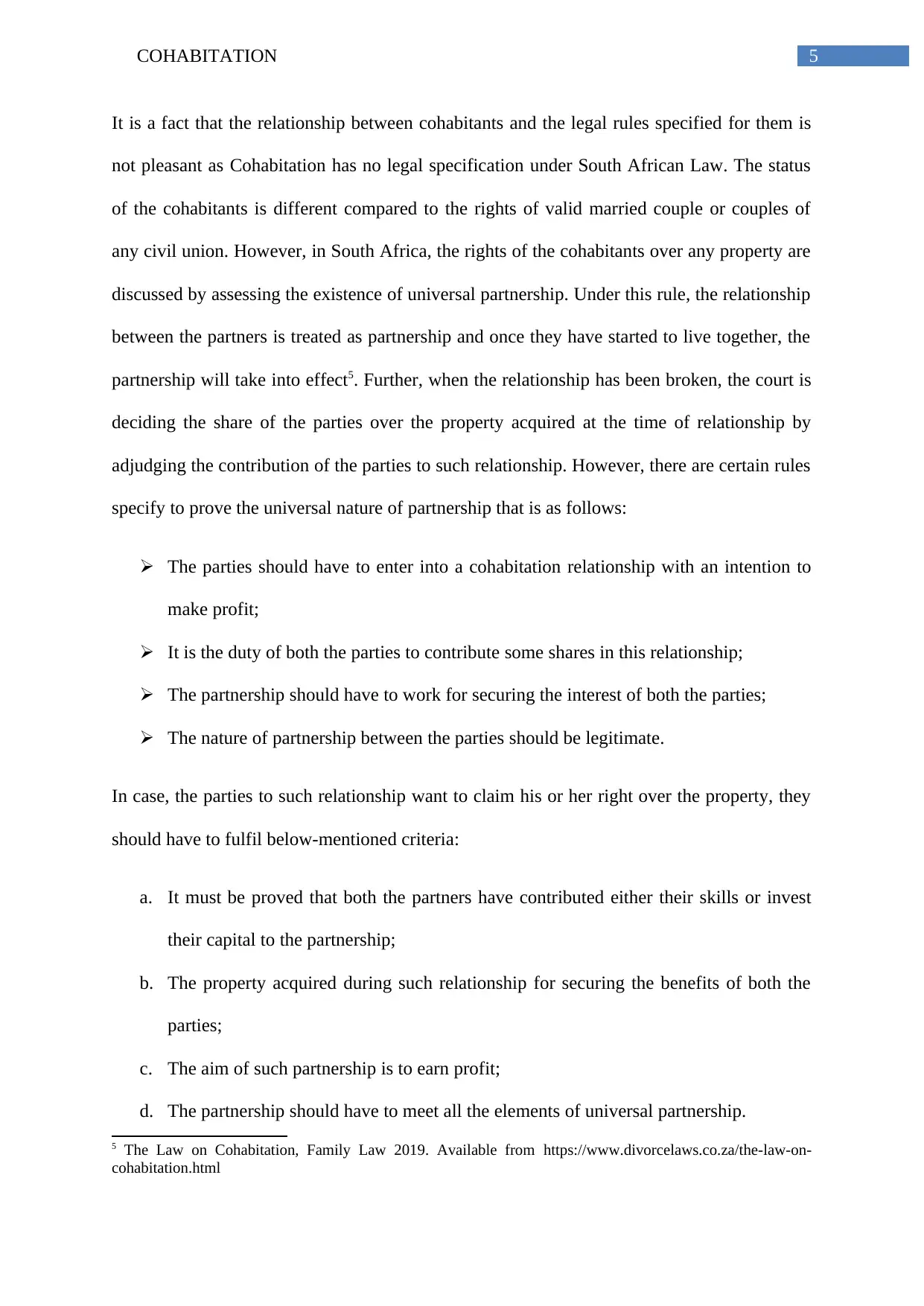
5COHABITATION
It is a fact that the relationship between cohabitants and the legal rules specified for them is
not pleasant as Cohabitation has no legal specification under South African Law. The status
of the cohabitants is different compared to the rights of valid married couple or couples of
any civil union. However, in South Africa, the rights of the cohabitants over any property are
discussed by assessing the existence of universal partnership. Under this rule, the relationship
between the partners is treated as partnership and once they have started to live together, the
partnership will take into effect5. Further, when the relationship has been broken, the court is
deciding the share of the parties over the property acquired at the time of relationship by
adjudging the contribution of the parties to such relationship. However, there are certain rules
specify to prove the universal nature of partnership that is as follows:
The parties should have to enter into a cohabitation relationship with an intention to
make profit;
It is the duty of both the parties to contribute some shares in this relationship;
The partnership should have to work for securing the interest of both the parties;
The nature of partnership between the parties should be legitimate.
In case, the parties to such relationship want to claim his or her right over the property, they
should have to fulfil below-mentioned criteria:
a. It must be proved that both the partners have contributed either their skills or invest
their capital to the partnership;
b. The property acquired during such relationship for securing the benefits of both the
parties;
c. The aim of such partnership is to earn profit;
d. The partnership should have to meet all the elements of universal partnership.
5 The Law on Cohabitation, Family Law 2019. Available from https://www.divorcelaws.co.za/the-law-on-
cohabitation.html
It is a fact that the relationship between cohabitants and the legal rules specified for them is
not pleasant as Cohabitation has no legal specification under South African Law. The status
of the cohabitants is different compared to the rights of valid married couple or couples of
any civil union. However, in South Africa, the rights of the cohabitants over any property are
discussed by assessing the existence of universal partnership. Under this rule, the relationship
between the partners is treated as partnership and once they have started to live together, the
partnership will take into effect5. Further, when the relationship has been broken, the court is
deciding the share of the parties over the property acquired at the time of relationship by
adjudging the contribution of the parties to such relationship. However, there are certain rules
specify to prove the universal nature of partnership that is as follows:
The parties should have to enter into a cohabitation relationship with an intention to
make profit;
It is the duty of both the parties to contribute some shares in this relationship;
The partnership should have to work for securing the interest of both the parties;
The nature of partnership between the parties should be legitimate.
In case, the parties to such relationship want to claim his or her right over the property, they
should have to fulfil below-mentioned criteria:
a. It must be proved that both the partners have contributed either their skills or invest
their capital to the partnership;
b. The property acquired during such relationship for securing the benefits of both the
parties;
c. The aim of such partnership is to earn profit;
d. The partnership should have to meet all the elements of universal partnership.
5 The Law on Cohabitation, Family Law 2019. Available from https://www.divorcelaws.co.za/the-law-on-
cohabitation.html
⊘ This is a preview!⊘
Do you want full access?
Subscribe today to unlock all pages.

Trusted by 1+ million students worldwide
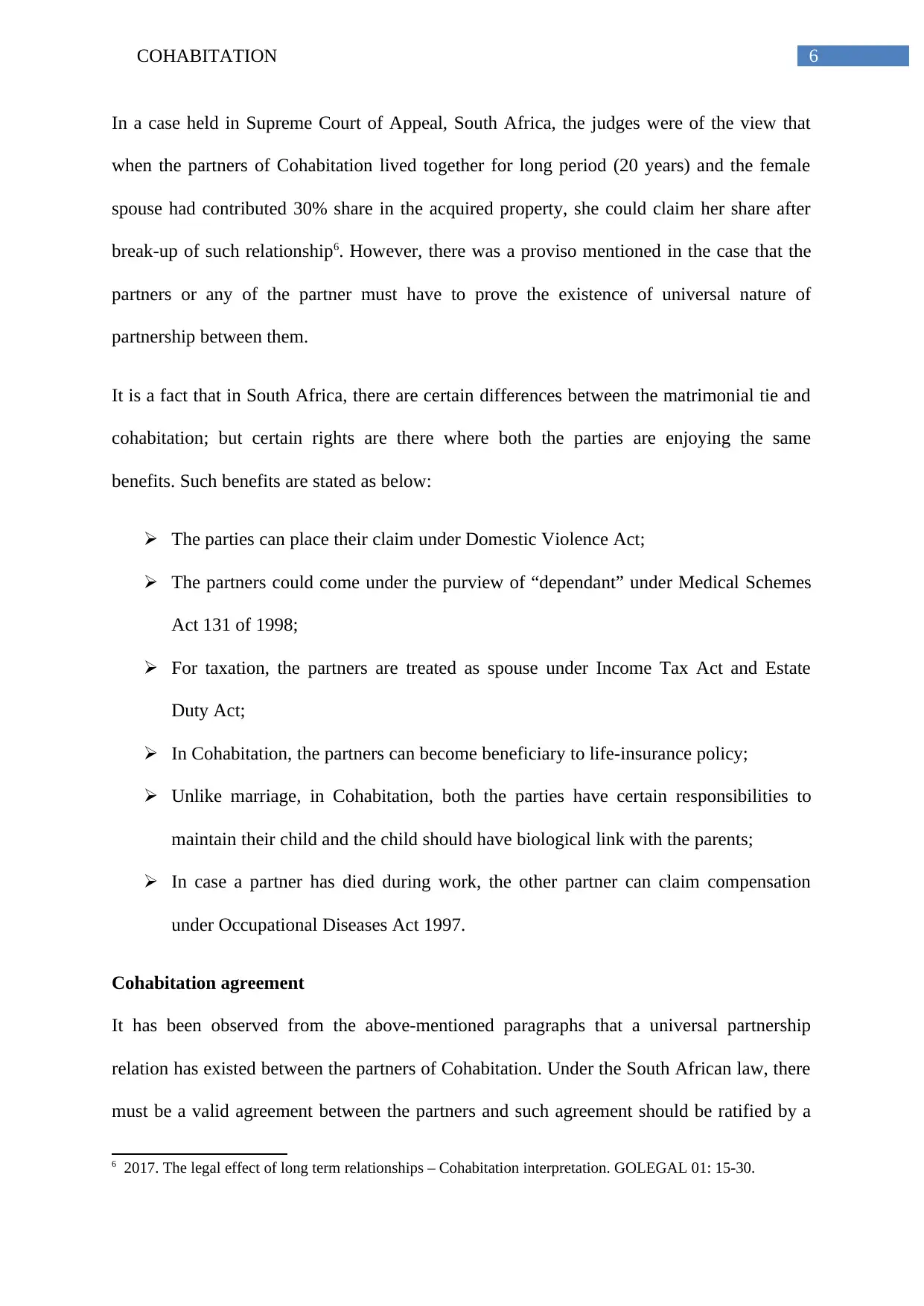
6COHABITATION
In a case held in Supreme Court of Appeal, South Africa, the judges were of the view that
when the partners of Cohabitation lived together for long period (20 years) and the female
spouse had contributed 30% share in the acquired property, she could claim her share after
break-up of such relationship6. However, there was a proviso mentioned in the case that the
partners or any of the partner must have to prove the existence of universal nature of
partnership between them.
It is a fact that in South Africa, there are certain differences between the matrimonial tie and
cohabitation; but certain rights are there where both the parties are enjoying the same
benefits. Such benefits are stated as below:
The parties can place their claim under Domestic Violence Act;
The partners could come under the purview of “dependant” under Medical Schemes
Act 131 of 1998;
For taxation, the partners are treated as spouse under Income Tax Act and Estate
Duty Act;
In Cohabitation, the partners can become beneficiary to life-insurance policy;
Unlike marriage, in Cohabitation, both the parties have certain responsibilities to
maintain their child and the child should have biological link with the parents;
In case a partner has died during work, the other partner can claim compensation
under Occupational Diseases Act 1997.
Cohabitation agreement
It has been observed from the above-mentioned paragraphs that a universal partnership
relation has existed between the partners of Cohabitation. Under the South African law, there
must be a valid agreement between the partners and such agreement should be ratified by a
6 2017. The legal effect of long term relationships – Cohabitation interpretation. GOLEGAL 01: 15-30.
In a case held in Supreme Court of Appeal, South Africa, the judges were of the view that
when the partners of Cohabitation lived together for long period (20 years) and the female
spouse had contributed 30% share in the acquired property, she could claim her share after
break-up of such relationship6. However, there was a proviso mentioned in the case that the
partners or any of the partner must have to prove the existence of universal nature of
partnership between them.
It is a fact that in South Africa, there are certain differences between the matrimonial tie and
cohabitation; but certain rights are there where both the parties are enjoying the same
benefits. Such benefits are stated as below:
The parties can place their claim under Domestic Violence Act;
The partners could come under the purview of “dependant” under Medical Schemes
Act 131 of 1998;
For taxation, the partners are treated as spouse under Income Tax Act and Estate
Duty Act;
In Cohabitation, the partners can become beneficiary to life-insurance policy;
Unlike marriage, in Cohabitation, both the parties have certain responsibilities to
maintain their child and the child should have biological link with the parents;
In case a partner has died during work, the other partner can claim compensation
under Occupational Diseases Act 1997.
Cohabitation agreement
It has been observed from the above-mentioned paragraphs that a universal partnership
relation has existed between the partners of Cohabitation. Under the South African law, there
must be a valid agreement between the partners and such agreement should be ratified by a
6 2017. The legal effect of long term relationships – Cohabitation interpretation. GOLEGAL 01: 15-30.
Paraphrase This Document
Need a fresh take? Get an instant paraphrase of this document with our AI Paraphraser
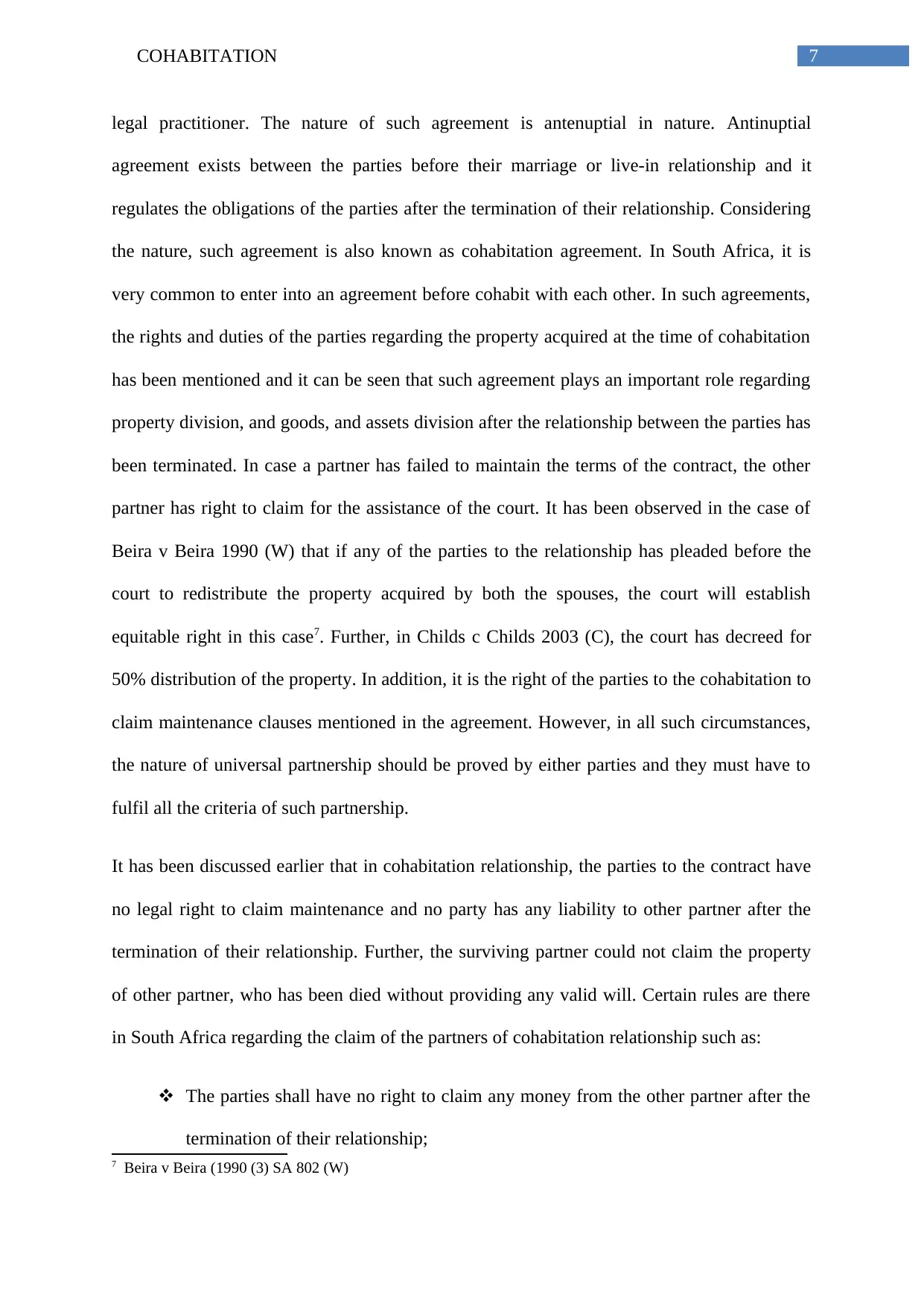
7COHABITATION
legal practitioner. The nature of such agreement is antenuptial in nature. Antinuptial
agreement exists between the parties before their marriage or live-in relationship and it
regulates the obligations of the parties after the termination of their relationship. Considering
the nature, such agreement is also known as cohabitation agreement. In South Africa, it is
very common to enter into an agreement before cohabit with each other. In such agreements,
the rights and duties of the parties regarding the property acquired at the time of cohabitation
has been mentioned and it can be seen that such agreement plays an important role regarding
property division, and goods, and assets division after the relationship between the parties has
been terminated. In case a partner has failed to maintain the terms of the contract, the other
partner has right to claim for the assistance of the court. It has been observed in the case of
Beira v Beira 1990 (W) that if any of the parties to the relationship has pleaded before the
court to redistribute the property acquired by both the spouses, the court will establish
equitable right in this case7. Further, in Childs c Childs 2003 (C), the court has decreed for
50% distribution of the property. In addition, it is the right of the parties to the cohabitation to
claim maintenance clauses mentioned in the agreement. However, in all such circumstances,
the nature of universal partnership should be proved by either parties and they must have to
fulfil all the criteria of such partnership.
It has been discussed earlier that in cohabitation relationship, the parties to the contract have
no legal right to claim maintenance and no party has any liability to other partner after the
termination of their relationship. Further, the surviving partner could not claim the property
of other partner, who has been died without providing any valid will. Certain rules are there
in South Africa regarding the claim of the partners of cohabitation relationship such as:
The parties shall have no right to claim any money from the other partner after the
termination of their relationship;
7 Beira v Beira (1990 (3) SA 802 (W)
legal practitioner. The nature of such agreement is antenuptial in nature. Antinuptial
agreement exists between the parties before their marriage or live-in relationship and it
regulates the obligations of the parties after the termination of their relationship. Considering
the nature, such agreement is also known as cohabitation agreement. In South Africa, it is
very common to enter into an agreement before cohabit with each other. In such agreements,
the rights and duties of the parties regarding the property acquired at the time of cohabitation
has been mentioned and it can be seen that such agreement plays an important role regarding
property division, and goods, and assets division after the relationship between the parties has
been terminated. In case a partner has failed to maintain the terms of the contract, the other
partner has right to claim for the assistance of the court. It has been observed in the case of
Beira v Beira 1990 (W) that if any of the parties to the relationship has pleaded before the
court to redistribute the property acquired by both the spouses, the court will establish
equitable right in this case7. Further, in Childs c Childs 2003 (C), the court has decreed for
50% distribution of the property. In addition, it is the right of the parties to the cohabitation to
claim maintenance clauses mentioned in the agreement. However, in all such circumstances,
the nature of universal partnership should be proved by either parties and they must have to
fulfil all the criteria of such partnership.
It has been discussed earlier that in cohabitation relationship, the parties to the contract have
no legal right to claim maintenance and no party has any liability to other partner after the
termination of their relationship. Further, the surviving partner could not claim the property
of other partner, who has been died without providing any valid will. Certain rules are there
in South Africa regarding the claim of the partners of cohabitation relationship such as:
The parties shall have no right to claim any money from the other partner after the
termination of their relationship;
7 Beira v Beira (1990 (3) SA 802 (W)
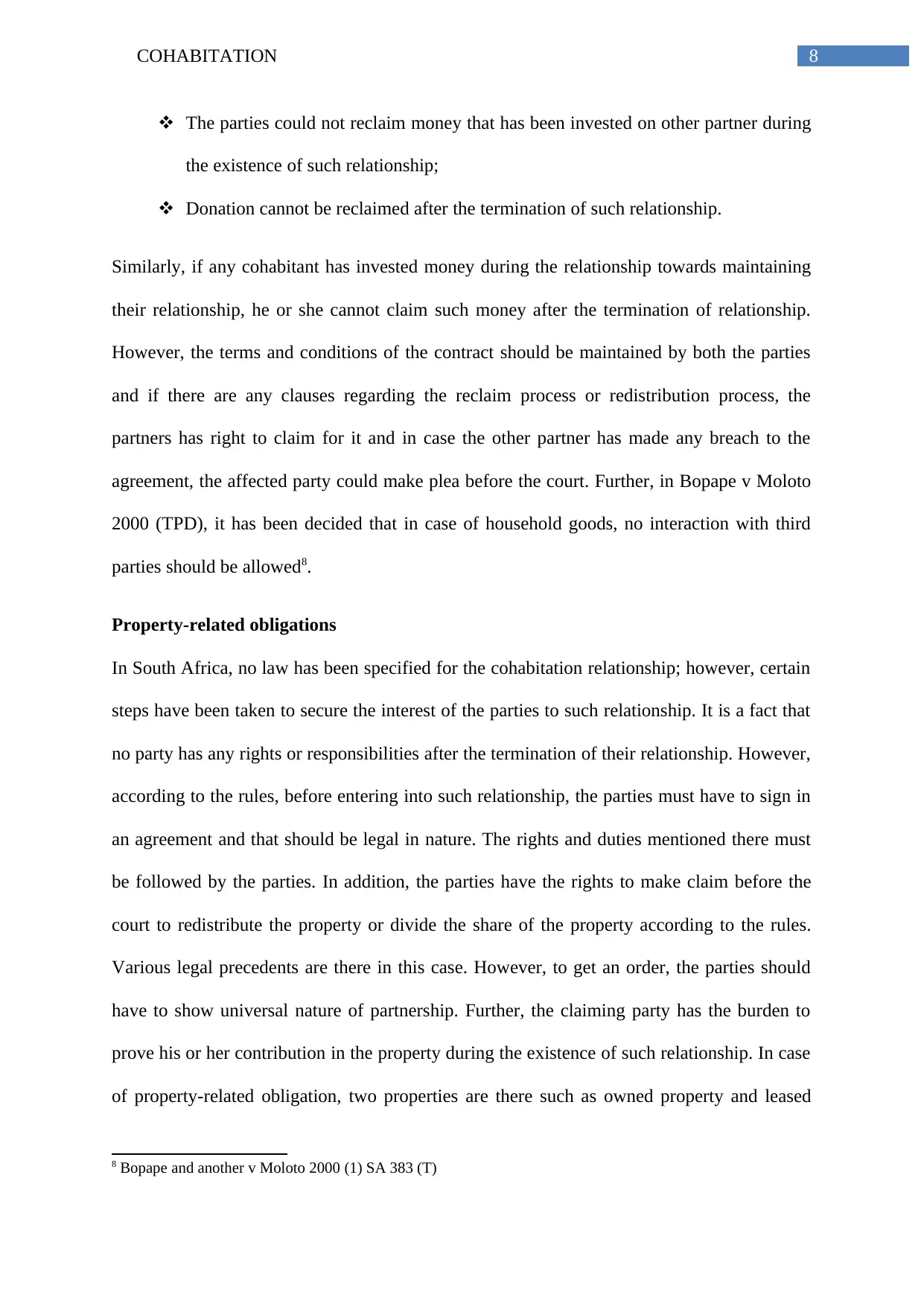
8COHABITATION
The parties could not reclaim money that has been invested on other partner during
the existence of such relationship;
Donation cannot be reclaimed after the termination of such relationship.
Similarly, if any cohabitant has invested money during the relationship towards maintaining
their relationship, he or she cannot claim such money after the termination of relationship.
However, the terms and conditions of the contract should be maintained by both the parties
and if there are any clauses regarding the reclaim process or redistribution process, the
partners has right to claim for it and in case the other partner has made any breach to the
agreement, the affected party could make plea before the court. Further, in Bopape v Moloto
2000 (TPD), it has been decided that in case of household goods, no interaction with third
parties should be allowed8.
Property-related obligations
In South Africa, no law has been specified for the cohabitation relationship; however, certain
steps have been taken to secure the interest of the parties to such relationship. It is a fact that
no party has any rights or responsibilities after the termination of their relationship. However,
according to the rules, before entering into such relationship, the parties must have to sign in
an agreement and that should be legal in nature. The rights and duties mentioned there must
be followed by the parties. In addition, the parties have the rights to make claim before the
court to redistribute the property or divide the share of the property according to the rules.
Various legal precedents are there in this case. However, to get an order, the parties should
have to show universal nature of partnership. Further, the claiming party has the burden to
prove his or her contribution in the property during the existence of such relationship. In case
of property-related obligation, two properties are there such as owned property and leased
8 Bopape and another v Moloto 2000 (1) SA 383 (T)
The parties could not reclaim money that has been invested on other partner during
the existence of such relationship;
Donation cannot be reclaimed after the termination of such relationship.
Similarly, if any cohabitant has invested money during the relationship towards maintaining
their relationship, he or she cannot claim such money after the termination of relationship.
However, the terms and conditions of the contract should be maintained by both the parties
and if there are any clauses regarding the reclaim process or redistribution process, the
partners has right to claim for it and in case the other partner has made any breach to the
agreement, the affected party could make plea before the court. Further, in Bopape v Moloto
2000 (TPD), it has been decided that in case of household goods, no interaction with third
parties should be allowed8.
Property-related obligations
In South Africa, no law has been specified for the cohabitation relationship; however, certain
steps have been taken to secure the interest of the parties to such relationship. It is a fact that
no party has any rights or responsibilities after the termination of their relationship. However,
according to the rules, before entering into such relationship, the parties must have to sign in
an agreement and that should be legal in nature. The rights and duties mentioned there must
be followed by the parties. In addition, the parties have the rights to make claim before the
court to redistribute the property or divide the share of the property according to the rules.
Various legal precedents are there in this case. However, to get an order, the parties should
have to show universal nature of partnership. Further, the claiming party has the burden to
prove his or her contribution in the property during the existence of such relationship. In case
of property-related obligation, two properties are there such as owned property and leased
8 Bopape and another v Moloto 2000 (1) SA 383 (T)
⊘ This is a preview!⊘
Do you want full access?
Subscribe today to unlock all pages.

Trusted by 1+ million students worldwide
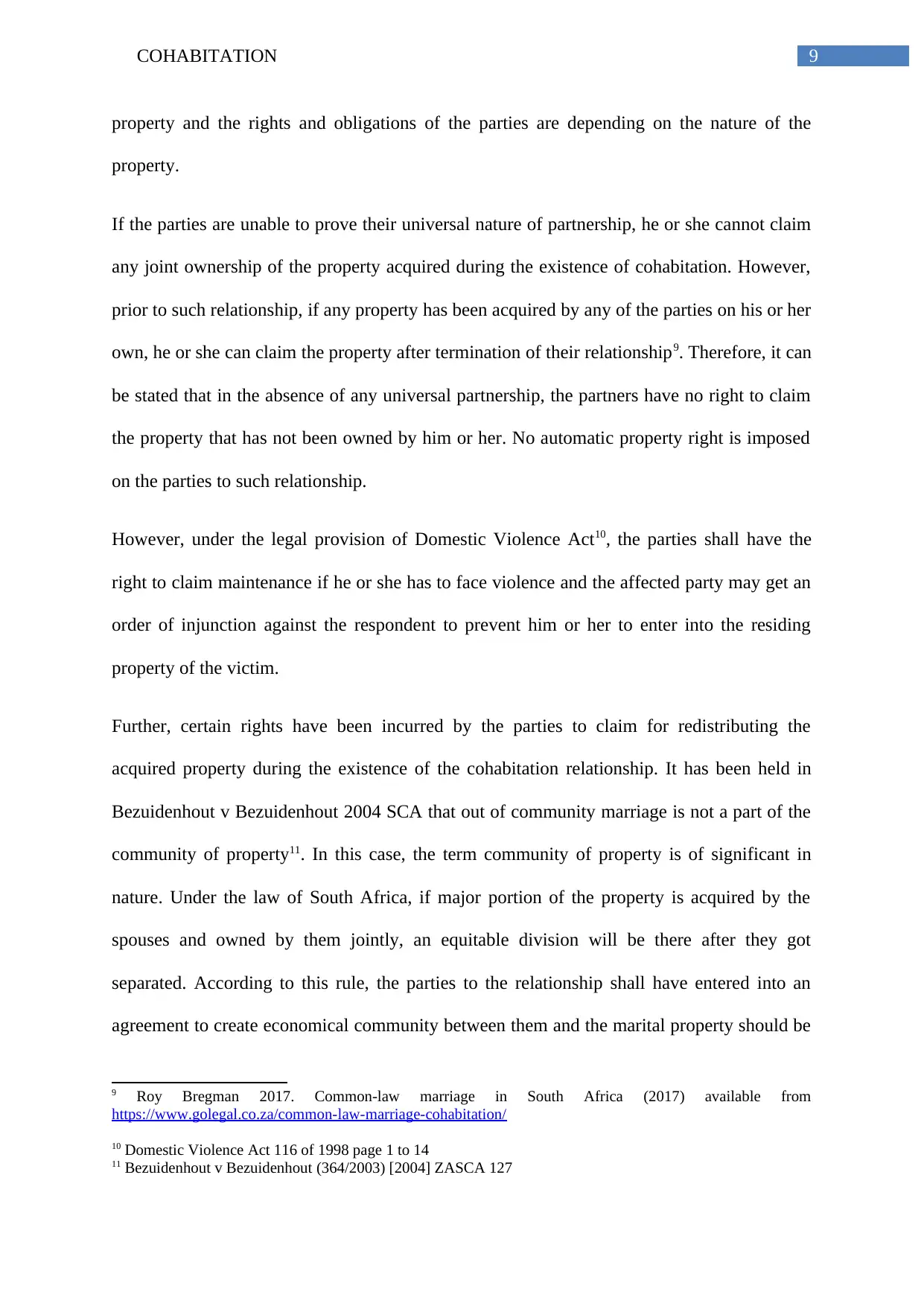
9COHABITATION
property and the rights and obligations of the parties are depending on the nature of the
property.
If the parties are unable to prove their universal nature of partnership, he or she cannot claim
any joint ownership of the property acquired during the existence of cohabitation. However,
prior to such relationship, if any property has been acquired by any of the parties on his or her
own, he or she can claim the property after termination of their relationship9. Therefore, it can
be stated that in the absence of any universal partnership, the partners have no right to claim
the property that has not been owned by him or her. No automatic property right is imposed
on the parties to such relationship.
However, under the legal provision of Domestic Violence Act10, the parties shall have the
right to claim maintenance if he or she has to face violence and the affected party may get an
order of injunction against the respondent to prevent him or her to enter into the residing
property of the victim.
Further, certain rights have been incurred by the parties to claim for redistributing the
acquired property during the existence of the cohabitation relationship. It has been held in
Bezuidenhout v Bezuidenhout 2004 SCA that out of community marriage is not a part of the
community of property11. In this case, the term community of property is of significant in
nature. Under the law of South Africa, if major portion of the property is acquired by the
spouses and owned by them jointly, an equitable division will be there after they got
separated. According to this rule, the parties to the relationship shall have entered into an
agreement to create economical community between them and the marital property should be
9 Roy Bregman 2017. Common-law marriage in South Africa (2017) available from
https://www.golegal.co.za/common-law-marriage-cohabitation/
10 Domestic Violence Act 116 of 1998 page 1 to 14
11 Bezuidenhout v Bezuidenhout (364/2003) [2004] ZASCA 127
property and the rights and obligations of the parties are depending on the nature of the
property.
If the parties are unable to prove their universal nature of partnership, he or she cannot claim
any joint ownership of the property acquired during the existence of cohabitation. However,
prior to such relationship, if any property has been acquired by any of the parties on his or her
own, he or she can claim the property after termination of their relationship9. Therefore, it can
be stated that in the absence of any universal partnership, the partners have no right to claim
the property that has not been owned by him or her. No automatic property right is imposed
on the parties to such relationship.
However, under the legal provision of Domestic Violence Act10, the parties shall have the
right to claim maintenance if he or she has to face violence and the affected party may get an
order of injunction against the respondent to prevent him or her to enter into the residing
property of the victim.
Further, certain rights have been incurred by the parties to claim for redistributing the
acquired property during the existence of the cohabitation relationship. It has been held in
Bezuidenhout v Bezuidenhout 2004 SCA that out of community marriage is not a part of the
community of property11. In this case, the term community of property is of significant in
nature. Under the law of South Africa, if major portion of the property is acquired by the
spouses and owned by them jointly, an equitable division will be there after they got
separated. According to this rule, the parties to the relationship shall have entered into an
agreement to create economical community between them and the marital property should be
9 Roy Bregman 2017. Common-law marriage in South Africa (2017) available from
https://www.golegal.co.za/common-law-marriage-cohabitation/
10 Domestic Violence Act 116 of 1998 page 1 to 14
11 Bezuidenhout v Bezuidenhout (364/2003) [2004] ZASCA 127
Paraphrase This Document
Need a fresh take? Get an instant paraphrase of this document with our AI Paraphraser
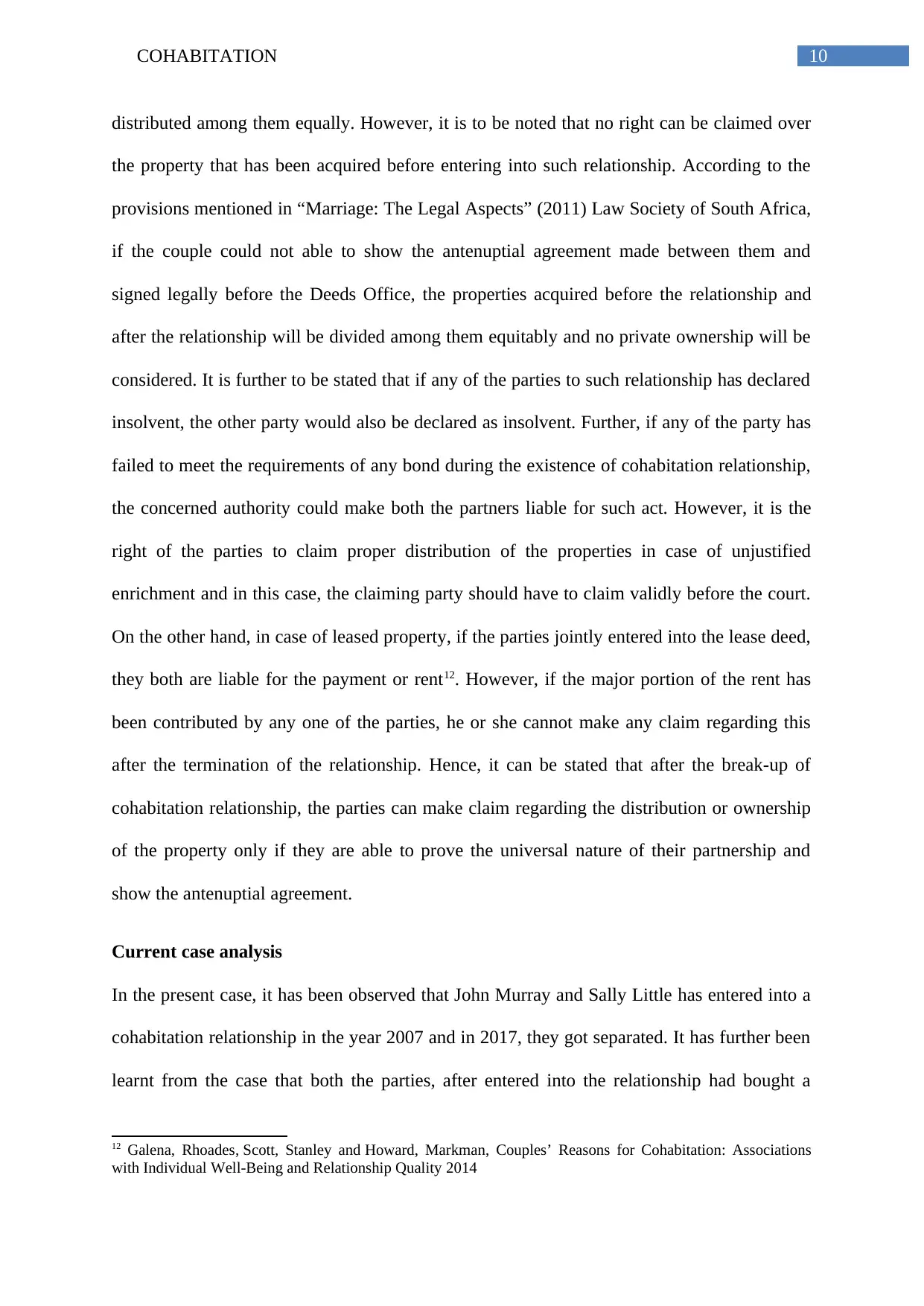
10COHABITATION
distributed among them equally. However, it is to be noted that no right can be claimed over
the property that has been acquired before entering into such relationship. According to the
provisions mentioned in “Marriage: The Legal Aspects” (2011) Law Society of South Africa,
if the couple could not able to show the antenuptial agreement made between them and
signed legally before the Deeds Office, the properties acquired before the relationship and
after the relationship will be divided among them equitably and no private ownership will be
considered. It is further to be stated that if any of the parties to such relationship has declared
insolvent, the other party would also be declared as insolvent. Further, if any of the party has
failed to meet the requirements of any bond during the existence of cohabitation relationship,
the concerned authority could make both the partners liable for such act. However, it is the
right of the parties to claim proper distribution of the properties in case of unjustified
enrichment and in this case, the claiming party should have to claim validly before the court.
On the other hand, in case of leased property, if the parties jointly entered into the lease deed,
they both are liable for the payment or rent12. However, if the major portion of the rent has
been contributed by any one of the parties, he or she cannot make any claim regarding this
after the termination of the relationship. Hence, it can be stated that after the break-up of
cohabitation relationship, the parties can make claim regarding the distribution or ownership
of the property only if they are able to prove the universal nature of their partnership and
show the antenuptial agreement.
Current case analysis
In the present case, it has been observed that John Murray and Sally Little has entered into a
cohabitation relationship in the year 2007 and in 2017, they got separated. It has further been
learnt from the case that both the parties, after entered into the relationship had bought a
12 Galena, Rhoades, Scott, Stanley and Howard, Markman, Couples’ Reasons for Cohabitation: Associations
with Individual Well-Being and Relationship Quality 2014
distributed among them equally. However, it is to be noted that no right can be claimed over
the property that has been acquired before entering into such relationship. According to the
provisions mentioned in “Marriage: The Legal Aspects” (2011) Law Society of South Africa,
if the couple could not able to show the antenuptial agreement made between them and
signed legally before the Deeds Office, the properties acquired before the relationship and
after the relationship will be divided among them equitably and no private ownership will be
considered. It is further to be stated that if any of the parties to such relationship has declared
insolvent, the other party would also be declared as insolvent. Further, if any of the party has
failed to meet the requirements of any bond during the existence of cohabitation relationship,
the concerned authority could make both the partners liable for such act. However, it is the
right of the parties to claim proper distribution of the properties in case of unjustified
enrichment and in this case, the claiming party should have to claim validly before the court.
On the other hand, in case of leased property, if the parties jointly entered into the lease deed,
they both are liable for the payment or rent12. However, if the major portion of the rent has
been contributed by any one of the parties, he or she cannot make any claim regarding this
after the termination of the relationship. Hence, it can be stated that after the break-up of
cohabitation relationship, the parties can make claim regarding the distribution or ownership
of the property only if they are able to prove the universal nature of their partnership and
show the antenuptial agreement.
Current case analysis
In the present case, it has been observed that John Murray and Sally Little has entered into a
cohabitation relationship in the year 2007 and in 2017, they got separated. It has further been
learnt from the case that both the parties, after entered into the relationship had bought a
12 Galena, Rhoades, Scott, Stanley and Howard, Markman, Couples’ Reasons for Cohabitation: Associations
with Individual Well-Being and Relationship Quality 2014
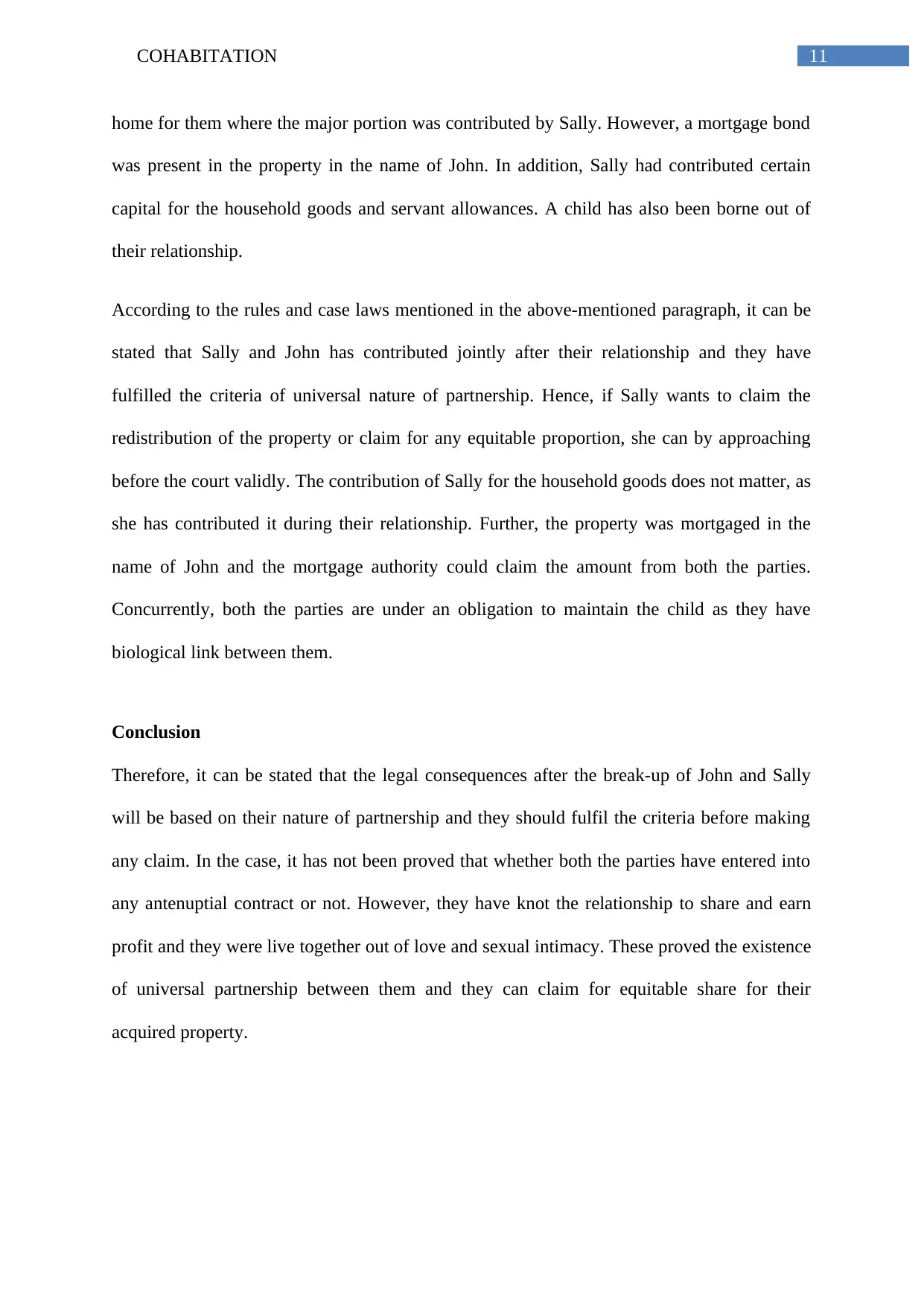
11COHABITATION
home for them where the major portion was contributed by Sally. However, a mortgage bond
was present in the property in the name of John. In addition, Sally had contributed certain
capital for the household goods and servant allowances. A child has also been borne out of
their relationship.
According to the rules and case laws mentioned in the above-mentioned paragraph, it can be
stated that Sally and John has contributed jointly after their relationship and they have
fulfilled the criteria of universal nature of partnership. Hence, if Sally wants to claim the
redistribution of the property or claim for any equitable proportion, she can by approaching
before the court validly. The contribution of Sally for the household goods does not matter, as
she has contributed it during their relationship. Further, the property was mortgaged in the
name of John and the mortgage authority could claim the amount from both the parties.
Concurrently, both the parties are under an obligation to maintain the child as they have
biological link between them.
Conclusion
Therefore, it can be stated that the legal consequences after the break-up of John and Sally
will be based on their nature of partnership and they should fulfil the criteria before making
any claim. In the case, it has not been proved that whether both the parties have entered into
any antenuptial contract or not. However, they have knot the relationship to share and earn
profit and they were live together out of love and sexual intimacy. These proved the existence
of universal partnership between them and they can claim for equitable share for their
acquired property.
home for them where the major portion was contributed by Sally. However, a mortgage bond
was present in the property in the name of John. In addition, Sally had contributed certain
capital for the household goods and servant allowances. A child has also been borne out of
their relationship.
According to the rules and case laws mentioned in the above-mentioned paragraph, it can be
stated that Sally and John has contributed jointly after their relationship and they have
fulfilled the criteria of universal nature of partnership. Hence, if Sally wants to claim the
redistribution of the property or claim for any equitable proportion, she can by approaching
before the court validly. The contribution of Sally for the household goods does not matter, as
she has contributed it during their relationship. Further, the property was mortgaged in the
name of John and the mortgage authority could claim the amount from both the parties.
Concurrently, both the parties are under an obligation to maintain the child as they have
biological link between them.
Conclusion
Therefore, it can be stated that the legal consequences after the break-up of John and Sally
will be based on their nature of partnership and they should fulfil the criteria before making
any claim. In the case, it has not been proved that whether both the parties have entered into
any antenuptial contract or not. However, they have knot the relationship to share and earn
profit and they were live together out of love and sexual intimacy. These proved the existence
of universal partnership between them and they can claim for equitable share for their
acquired property.
⊘ This is a preview!⊘
Do you want full access?
Subscribe today to unlock all pages.

Trusted by 1+ million students worldwide
1 out of 13
Related Documents
Your All-in-One AI-Powered Toolkit for Academic Success.
+13062052269
info@desklib.com
Available 24*7 on WhatsApp / Email
![[object Object]](/_next/static/media/star-bottom.7253800d.svg)
Unlock your academic potential
Copyright © 2020–2026 A2Z Services. All Rights Reserved. Developed and managed by ZUCOL.





